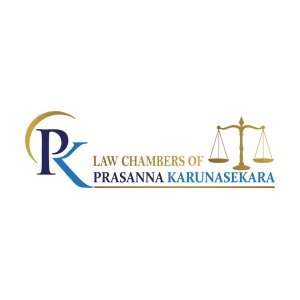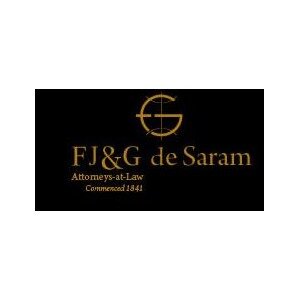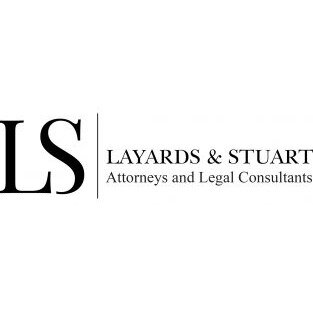Best New Business Formation Lawyers in Sri Lanka
Share your needs with us, get contacted by law firms.
Free. Takes 2 min.
Or refine your search by selecting a city:
List of the best lawyers in Sri Lanka
About New Business Formation Law in Sri Lanka
The legal framework for new business formation in Sri Lanka offers a robust structure that supports entrepreneurs and investors. Predominantly governed by the Companies Act No. 7 of 2007, the laws provide a comprehensive guide on incorporating companies, partnership criteria, and regulations governing corporate conduct. The Board of Investment (BOI) also plays a pivotal role, offering incentives and facilitating foreign investment. Additionally, Sri Lanka provides support for sole proprietors and other forms of business entities like partnerships and public or private limited companies.
Why You May Need a Lawyer
While it is possible to start a business in Sri Lanka without legal assistance, many entrepreneurs choose to consult with a lawyer due to several common scenarios:
- Understanding Legal Requirements: Navigating the extensive legal requirements and documentation necessary for company registration can be complex.
- Protection of Intellectual Property: Legal assistance is crucial for protecting innovations, particularly for start-ups reliant on proprietary technology or designs.
- Foreign Investment Facilitation: If your business involves foreign investment, understanding the legalities surrounding it necessitates expert advice.
- Licensing and Permits: Each industry may require particular licenses or permits, the absence of which can lead to legal penalties.
- Dispute Resolution: Lawyers can provide support in any disputes regarding contracts or business dealings.
Local Laws Overview
Key aspects of local laws related to New Business Formation in Sri Lanka include:
- Business Structure: Determining the right business structure (i.e., sole proprietorship, partnership, or company) is crucial and affects liability and tax obligations.
- Company Registration: All companies must be registered with the Department of Registrar of Companies, which includes submitting the appropriate documentation like the Articles of Association.
- Tax Compliance: Businesses must adhere to tax obligations, including Value Added Tax (VAT), corporate tax, and income tax regulations.
- Foreign Ownership Regulations: Regulations facilitate foreign ownership, yet certain sectors may still have restrictions that must be understood.
- Employment Laws: Complying with labor laws, including minimum wage, work conditions, and employee rights, is crucial for business operations.
Frequently Asked Questions
1. What types of business structures are available in Sri Lanka?
In Sri Lanka, business structures include sole proprietorships, partnerships, private limited companies, public limited companies, and branch offices for foreign companies.
2. How long does it take to register a business in Sri Lanka?
The process can vary but typically, the registration of a company can take between 7 to 14 business days, assuming all documents are in order.
3. What documents are required to register a company?
Key documents include the Articles of Association, Form 1 (company registration form), Form 18 (director details), and Form 19 (secretary details).
4. Is there a minimum capital requirement for starting a business?
The minimum capital requirement depends on the type of company being established, but for a private company, it is often as low as Rs. 100,000 or as needed for business operations.
5. Can foreign nationals fully own a business in Sri Lanka?
In many sectors, foreign nationals can own up to 100% of a business, but certain industries like retail may have restrictions or require special approval.
6. What is the role of the Board of Investment (BOI) in business formation?
The BOI provides incentives and support for businesses, particularly those involving foreign investment, covering areas like tax breaks and logistical support.
7. Do I need a separate license to operate in certain industries?
Yes, certain industries require specific licenses, such as financial services, telecommunications, and food and beverage outlets.
8. What is the process for obtaining a VAT registration?
Businesses with a turnover exceeding Rs. 3 million must register for VAT, which involves submitting a VAT registration form and relevant business details to the Inland Revenue Department.
9. How can I protect my business's intellectual property?
Protecting IP in Sri Lanka involves registering trademarks, patents, and copyrights with the National Intellectual Property Office (NIPO).
10. What are the ongoing compliance requirements post-registration?
Post-registration, companies must adhere to annual filing of returns, maintaining proper accounting records, and complying with VAT and tax regulations.
Additional Resources
Here are some resources that can be helpful:
- Department of Registrar of Companies: The official body for company registration and records maintenance.
- Board of Investment (BOI): Offers guidance and incentives for foreign and local investments.
- National Intellectual Property Office (NIPO): Responsible for IP rights registration and protection.
- Inland Revenue Department: Manages tax registration and compliance.
- Sri Lanka Export Development Board: Provides assistance for export-oriented businesses.
Next Steps
If you need legal assistance in New Business Formation in Sri Lanka, consider the following steps:
- Research and compile a list of qualified business lawyers with experience in Sri Lankan business law.
- Schedule consultations to discuss your business needs and compare potential legal pathways.
- Consult governmental bodies such as the BOI and Registrar of Companies for specific guidance and resources.
- Investigate additional local business forums or networks for shared experiences and advice.
- Outline a clear business plan and communicate this with your legal advisor to ensure all legal aspects align with your business goals.
Lawzana helps you find the best lawyers and law firms in Sri Lanka through a curated and pre-screened list of qualified legal professionals. Our platform offers rankings and detailed profiles of attorneys and law firms, allowing you to compare based on practice areas, including New Business Formation, experience, and client feedback.
Each profile includes a description of the firm's areas of practice, client reviews, team members and partners, year of establishment, spoken languages, office locations, contact information, social media presence, and any published articles or resources. Most firms on our platform speak English and are experienced in both local and international legal matters.
Get a quote from top-rated law firms in Sri Lanka — quickly, securely, and without unnecessary hassle.
Disclaimer:
The information provided on this page is for general informational purposes only and does not constitute legal advice. While we strive to ensure the accuracy and relevance of the content, legal information may change over time, and interpretations of the law can vary. You should always consult with a qualified legal professional for advice specific to your situation.
We disclaim all liability for actions taken or not taken based on the content of this page. If you believe any information is incorrect or outdated, please contact us, and we will review and update it where appropriate.
Browse new business formation law firms by city in Sri Lanka
Refine your search by selecting a city.

















